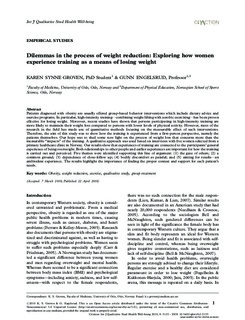| dc.contributor.author | Groven, Karen Synne | |
| dc.contributor.author | Engelsrud, Gunn | |
| dc.date.accessioned | 2010-09-21T11:38:27Z | |
| dc.date.available | 2010-09-21T11:38:27Z | |
| dc.date.issued | 2010-04-22 | |
| dc.identifier | Seksjon for kroppsøving og pedagogikk / Department of Physical Education | |
| dc.identifier.citation | International Journal of Qualitative Studies on Health and Well-being. 2010, 5(2), 1-13 | en_US |
| dc.identifier.issn | 1748-2623 | |
| dc.identifier.uri | http://hdl.handle.net/11250/170643 | |
| dc.description | © 2010 K. S. Groven & G. Engelsrud. This is an Open Access article distributed under the terms of the Creative Commons Attribution-
Noncommercial 3.0 Unported License (http://creativecommons.org/licenses/by-nc/3.0/), permitting all non-commercial use, distribution, and
reproduction in any medium, provided the original work is properly cited. | en_US |
| dc.description.abstract | Patients diagnosed with obesity are usually offered group-based behavior interventions which include dietary advice and
exercise programs. In particular, high-intensity training*combining weight lifting with aerobic exercising*has been proven
effective for losing weight. Moreover, recent studies have shown that persons participating in high-intensity training are
more likely to maintain their weight loss compared to persons with lower levels of physical activity. However, most of the
research in the field has made use of quantitative methods focusing on the measurable effect of such interventions.
Therefore, the aim of this study was to show how the training is experienced from a first-person perspective, namely the
patients themselves. Our hope was to shed some new light on the process of weight loss that concerns more than the
measurable ‘‘impacts’’ of the training. A qualitative approach was used based on interviews with five women selected from a
primary healthcare clinic in Norway. Our results show that experiences of training are connected to the participants’ general
experience of being overweight. Both relationships to other people and earlier experiences are important for how the training
is carried out and perceived. Five themes were identified supporting this line of argument: (1) the gaze of others; (2) a
common ground; (3) dependence of close-follow up; (4) bodily discomfort as painful; and (5) aiming for results*an
ambivalent experience. The results highlight the importance of finding the proper context and support for each patient’s
needs. | en_US |
| dc.language.iso | eng | en_US |
| dc.publisher | Coaction Publishing | en_US |
| dc.subject | obesity | en_US |
| dc.subject | weight reduction | en_US |
| dc.subject | exercise | en_US |
| dc.subject | qualitative study | en_US |
| dc.subject | group treatment | en_US |
| dc.title | Dilemmas in the process of weight reduction: Exploring how women experience training as a means of losing weight | en_US |
| dc.type | Journal article | en_US |
| dc.type | Peer reviewed | en_US |
| dc.subject.nsi | VDP::Medical disciplines: 700::Health sciences: 800 | en_US |
| dc.source.pagenumber | 1-13 | en_US |
